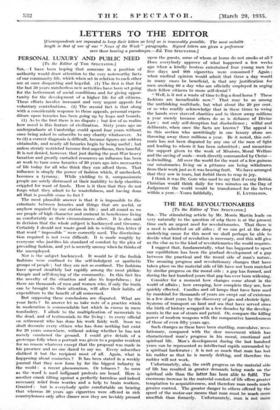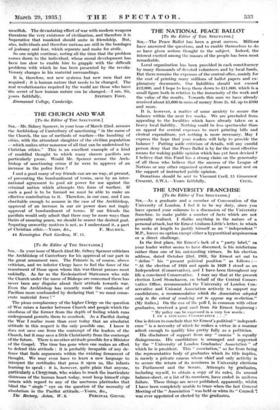THE REAL REVOLUTIONARIES
[To the Editor of THE SPECTATOR.] SIR,—The stimulating article by Mr. Morris Martin leads on very naturally to the question of why there is at the present time such an urgent need for revolutionaries. That there is a need is admitted on all sides ; if we can get at the .deep underlying cause for this need we shall perhaps be able to decide what kind of revolution is necessary, and this will give us the clue as to the kind of revolutionaries the world requires.
I suggest that, fundamentally, what has happened to upset our equilibrium has been the gradual development of a gap between the practical and the moral side of man's nature. The amazing progress and revolutionary changes that have taken place on the material side of life have not been matched by similar progress on the moral side ; a gap has formed, and during the last hundred years that gap has ever been widening.
Consider for a moment how changes come about in the world of affairs ; "how sweeping, how complete they-are, -how quickly effected. Candles and oil lamps that have been used by mankind for thousands of years are swept out of existence in a few short years by the discovery of gas and eleetric light. Systems of transport on land and sea that have served since the birth of history scrapped in a few decades by the develop- ments in the use of steam and petrol. Or, compare the killing power of modern weapons with the comparative harmlessness of those of even fifty years ago.
Such changes as these have been startling, convulsive; revo- lutionary, compared with the slow movement which has characterized man's progress in his moral, emotional and spiritual life. Man's development during the last hundred years can be represented as intellectual rapids surrounded by a spiritual backwater ; it is not so much that man has lost his rudder as that he is merely drifting, and therefore the rudder will not work.
Unfortunately, also, the swift progress on the material side of life has resulted in greater demands being made on the spiritual side than the latter has been able to fulfil. The enormous increase in the material comfort of life offers greater temptation to acquisitiveness, and therefore man needs much greater control. The .greater danger to others offered by the speed of the motor-car means that man must be much more unselfish than fOrmerly. Unfortunately, man is not more
unselfish. The devastating effect of war with modem weapons threatens the very existence of civilization, and therefore it is imperative that mankind should unite in friendship. But, alas, individuals and therefore nations are still in the bondages of jealousy and fear, which separate and make for strife.
So one might continue, noting all the time that the problem comes down to the individual, whose moral development has been too slow to enable him to grapple with the difficult problems with which he has been presented by the revolu- tionary changes in his material surroundings.
It is, therefore, not new systems but new men that are required ; it is human nature that needs to be changed. The Teal revolutionaries required by the world are those who have 'the secret of how human nature can be changed.—I am, Sir,
yours faithfully, STEPHEN FOOT. Emmanuel College, Cambridge.







































 Previous page
Previous page